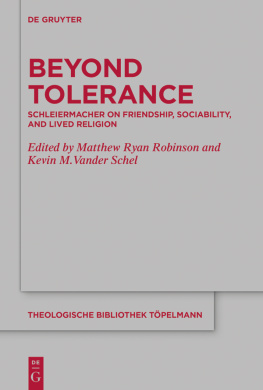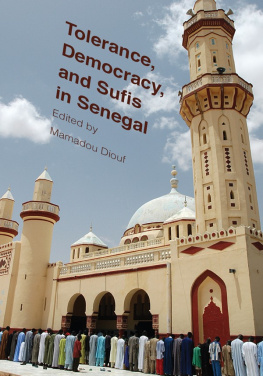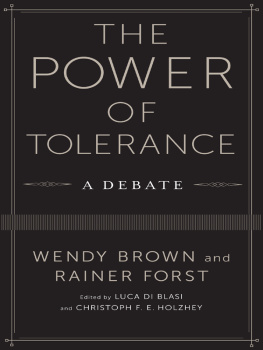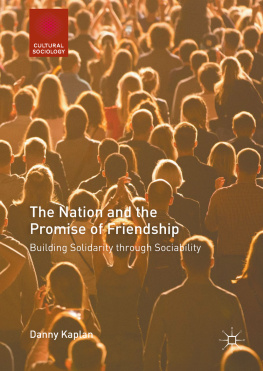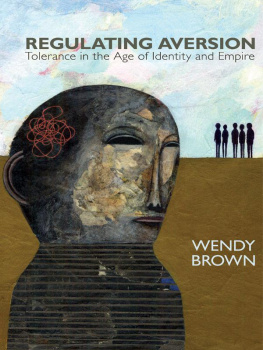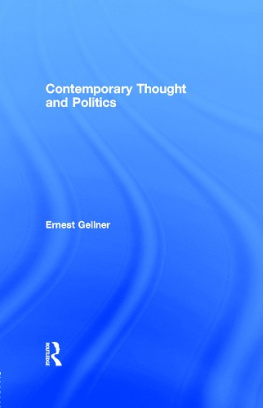Table of Contents
Guide

Beyond Tolerance
Theologische Bibliothek Tpelmann

Edited by
Bruce McCormack, Friederike Nssel
and Christoph Schwbel
Volume 184
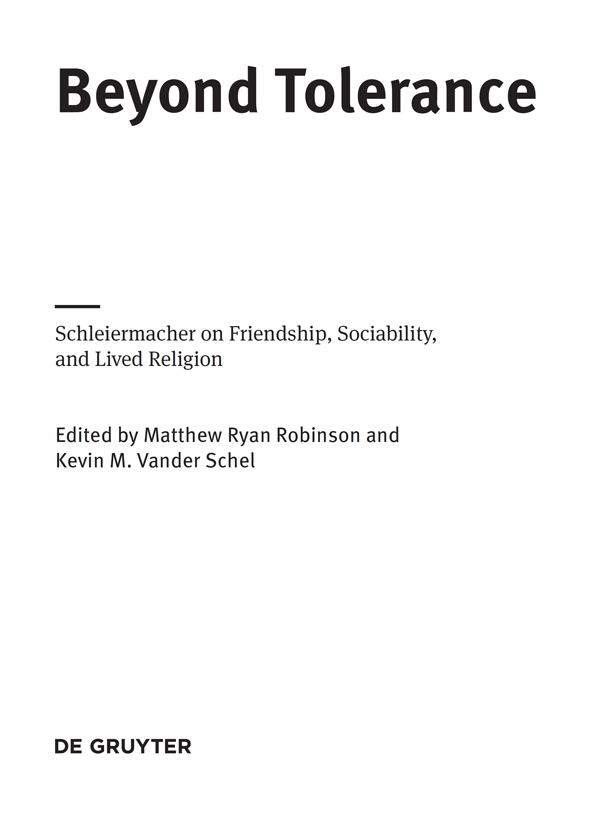
ISBN 978-3-11-061197-7
e-ISBN (PDF) 978-3-11-061373-5
e-ISBN (EPUB) 978-3-11-061219-6
ISSN 0563-4288
Library of Congress Control Number: 2019948043
Bibliographic information published by the Deutsche Nationalbibliothek
The Deutsche Nationalbibliothek lists this publication in the Deutsche Nationalbibliografie; detailed bibliographic data are available on the Internet at http://dnb.dnb.de.
2019 Walter de Gruyter GmbH, Berlin/Boston
www.degruyter.com
Abbreviations of Schleiermachers Collected Works
Friedrich Daniel Ernst Schleiermacher. Kritische Gesamtausgabe (KGA). Edited by Hans-Joachim Birkner, Gnter Meckenstock, Andreas Arndt, Jrg Dierken, Lutz Kppel, and Notger Slenczka. Berlin: De Gruyter, 1980.
| KGA I/1 | Jugendschriften 17871796 , ed. Gnter Meckenstock (1984) |
| KGA I/2 | Schriften aus der Berliner Zeit 17961799, ed. Gnter Meckenstock (1984) |
| KGA I/3 | Schriften aus der Berliner Zeit 18001802 , ed. Gnter Meckenstock (1988) |
| KGA I/5 | Schriften aus der Hallenser Zeit 18041807 , ed. Hermann Patsch (1995) |
| KGA I/6 | Universittschriften, Herakleitos, Kurze Darstellung des theologischen Studiums , ed. Dirk Schmid (1998) |
| KGA I/9 | Kirchenpolitische Schriften , ed. Gnter Meckenstock (2000) |
| KGA I/10 | Theologisch-dogmatische Abhandlungen und Gelegenheitsschriften , ed. Hans-Friedrich Traulsen (1990) |
| KGA I/12 | ber die Religion (2. )4. Auflage, Monologen (2. )4. Auflage , ed. Gnter Meckenstock (1995) |
| KGA I/13 | Der Christliche Glaube nach dem Grundstzen der evangelischen Kirche im Zusammenhange dargestellt , 2 vols., ed. Rolf Schfer (2003) |
| KGA II/10/12 | Vorlesungen ber die Dialektic , ed. Andreas Arndt (2011) |
| KGA II/16 | Vorlesungen ber die kirchliche Geographie und Statistik , ed. Simon Gerber (2011) |
| KGA V/2 | Briefwechsel 17961798 , eds. Andreas Arndt, Wolfgang Virmond (1988) |
| KGA V/3 | Briefwechsel 17991800 , eds. Andreas Arndt, Wolfgang Virmond (2015) |
| KGA V/5 | Briefwechsel 18011802 , eds. Andreas Arndt, Wolfgang Virmond (1999) |
| KGA V/6 | Briefwechsel 18021803 , eds. Andreas Arndt, Wolfgang Virmond (2012) |
| KGA V/8 | Briefwechsel 18041806 , eds. Andreas Arndt, Simon Gerber (2008) |
| KGA V/9 | Briefwechsel 18061807 , eds. Andreas Arndt, Simon Gerber (2011) |
Editors Introduction
While Schleiermachers unique contributions on themes of piety and religious subjectivity have generated rich debates in modern and contemporary theology, his influential analyses of sociability and intersubjectivity have garnered significantly less scholarly attention. Within Anglophone scholarship in particular, treatments of Schleiermachers theological and philosophical writings have often proceeded through a limited focus on themes of individuality and the interior and affective dimensions of religious faith.
Beyond its importance for correctly grasping the contours of his own thought, however, Schleiermachers understanding of sociability also presents intriguing analyses of social division and interpersonal development that anticipate pressing contemporary issues concerning the role of religious practice and identity in the context of social and political upheaval. The rise of populist movements and nationalistic fervor throughout the West have raised concerns about the fragility of liberal political values, chief among them tolerance. Moreover, as contemporary political philosophers such as Charles Taylor and Jrgen Habermas If a defining characteristic of contemporary populisms is their staunch resistance to diversity, a simple plea for greater tolerance appears inadequate. But what alternative social resources exist for cultivating the interpersonal relationships and mutual goodwill necessary for sustaining vibrant and peaceable communities? And how might the lived practices of religious communities carry potential to reinterpret or re-circuit these interpersonal tensions and transform the relationship with the cultural other ( Fremde ) from foe ( Feind ) to friend ( Freund )?
The ten essays presented in this volume seek to provide a unique constructive analysis of this shifting social discourse through the lens of Friedrich Schleiermachers thought, by focusing on themes of friendship and sociability as a potential path beyond mere tolerance. Each essay of the volume is written by an internationally-recognized scholar and examines Schleiermachers novel reflections on individuality, friendship, and sociability, while also attending to recent debates concerning the roles of religion as lived in contemporary political society.
The essays presented here reflect an intensive seminar discussion that took place on November 17, 2017 at the inaugural meeting of the International Schleiermacher Working Group, an initiative that grew out of the Schleiermacher Unit of the annual American Academy of Religion conference with the aim of fostering greater international collaboration and understanding of Schleiermachers writings. Participants from Germany, South Africa, Great Britain, Sweden, and the United States gathered at the campus of Boston College in Chestnut Hill, Massachusetts to present and discuss papers on the interconnected themes of friendship, sociability, and lived religious practice in Schleiermachers thought. The papers discussed at this workshop provided the initial drafts for the essays presented here.
Features of the Present Volume
This collection of essays, as it emerged from the workshop, presents a number of notable features. First, it illuminates the close interconnection between the concepts of individuality, friendship, and sociability in Schleiermachers theological and philosophical writings and indicates the ongoing implications of these related themes for contemporary systematic and practical theology. The essays gathered here provide a series of creative and original engagements with Schleiermachers writings that underscore both the fruitful interplay of these categories with one another, but no less their persistent influence in shaping central and much-discussed topics in Schleiermacher work, including immediate self-consciousness and religious community.
The volume presents original reflections on Schleiermachers thought that also move beyond familiar institutional barriers in theology and philosophy. While each of the contributors to this volume hold university positions in faculties of theology, religious studies, or philosophy, these ten essays point to aspects of Schleiermachers thought that cut across the customary disciplinary divisions of political philosophy and systematic, historical, and practical theology and attend to discussions of lived religious practices as embodied and contextualized within local communities.
Moreover, the essays consider these themes across multiple social contexts, reflecting an emerging international conversation that brings together recent developments in Schleiermacher scholarship in Germany, Scandinavia, Great Britain, North America, and South Africa. Thus, the volume illustrates important developing lines of convergence and cooperation between researchers operating in differing cultural and political climates and indicates a new interest in not only the historical significance but the ongoing contributions that Schleiermachers thought might make to a number of disciplinary and geographical fields of research.

